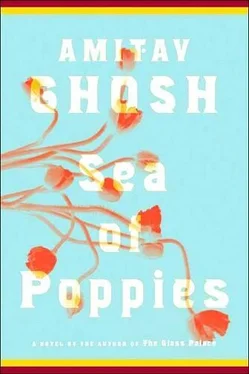'Why is this necessary, sir?' Neel began to protest as soon as the wedge was removed from his mouth. 'What is the purpose?'
The serjeant did not look up from the log-book in which he was entering the results of the examination, but the orderly leant over to whisper something about marks of identification and signs of communicable disease. This was not enough for Neel, who was now seized by a determination not to be ignored: 'Please, sir, is there a reason why I cannot have an answer to my question?'
Without a glance in his direction, the serjeant issued another order, in Hindusthani: Kapra utaro … take off his clothes.
The sepoys responded by pinning Neel's arms to his side: long practice had made them expert in stripping the clothes from convicts, many of whom would gladly have died – or killed – rather than be subjected to the shame of having their nakedness exposed. Neel's struggles presented no challenge to them and they quickly tore off the remnants of his clothing; then they held him upright, pinioning his limbs so as to fully expose his naked body to his jailers' scrutiny. Unexpectedly, Neel felt the touch of a hand, grazing against his toes, and he looked down to see the orderly brushing his feet with his fingertips, as if to ask forgiveness for what he was about to do. The gesture, in all its unforeseen humanity, had scarcely had time to register when the orderly's fingers dug into Neel's groin.
Lice? Crabs? Vermin?
None, sahib.
Birthmarks? Lesions?
No.
The touch of the orderly's fingers had a feel that Neel could never have imagined between two human beings – neither intimate nor angry, neither tender nor prurient – it was the disinterested touch of mastery, of purchase or conquest; it was as if his body had passed into the possession of a new owner, who was taking stock of it as a man might inspect a house he had recently acquired, searching for signs of disrepair or neglect, while mentally assigning each room to a new use.
'Syphilis? Gonorrhoea?'
These were the first English words the serjeant had used, and in speaking them he looked at the prisoner with the faintest hint of a smile.
Neel was now standing with his legs apart and his arms extended over his head while the orderly searched his flanks for birthmarks and other ineradicable signs of identification. But he did not miss the mockery in his jailer's glance, and was quick to respond. 'Sir,' he said, 'can you not afford me the dignity of a reply? Or is it that you do not trust yourself to speak English?'
The man's eyes flared and Neel saw that he had nettled him, simply by virtue of addressing him in his own tongue – a thing that was evidently counted as an act of intolerable insolence in an Indian convict, a defilement of the language. The knowledge of this – that even in his present state, stripped to his skin, powerless to defend himself from the hands that were taking an inventory of his body – he still possessed the ability to affront a man whose authority over his person was absolute: the awareness made Neel giddy, exultant, eager to explore this new realm of power; in this jail, he decided, as in the rest of his life as a convict, he would speak English whenever possible, everywhere possible, starting with this moment, here. But such was the urgency of this desire that words failed him and he could think of nothing to say; no words of his own would come to mind – only stray lines from passages that he had been made to commit to memory:
'… this is the excellent foppery of the world… to make guilty of our disasters, the sun, the moon and the stars…'
The serjeant interrupted him with an angry command: Gánd dekho … bend him over, check his arse…
With his head bowed between his legs, Neel still would not stop: 'Proud man, drest in a little brief authority, his glassy essence like an angry ape…' His voice rose till the words were echoing off the stone walls. The serjeant rose from his seat as Neel was straightening up. An arm's-length away, he came to a halt, drew his hand back and struck Neel across the face: 'Shut yer gob, quoddie.'
In some reflexive part of his mind, Neel noted that the serjeant had hit him with his left hand, and that had he been at home, he would have had to bathe and change. But that was in some other life: here what mattered was that he had succeeded at last in making the man speak to him in English. 'A very good day to you, sir,' he muttered, bowing his head.
'Get his bleedin arse out o' me sight.'
In a small adjoining room, Neel was handed a bundle of folded clothing. A sepoy enumerated the articles as he handed them over: one gamchha, two vests, two dhotis of dungri weave, one blanket; better take care of them, they're all you'll have for the next six months.
The unwashed dungaree cloth was thick and rough, its texture more like jute sacking than woven cotton. When shaken loose, the dhoti proved to be half the size, in length as well as breadth, of the six-yard stretch of fabric to which Neel was accustomed. Tied at the waist, it would fall no lower than the knees and was clearly meant to be worn as a langot – but Neel had never had occasion to tie a loincloth before and his hands fumbled so much that one of the sepoys snapped: What are you waiting for? Cover yourself! – as if it were by his own choice that he had been stripped of his clothes. The blood rushed to Neel's head and he thrust his pelvis forward, pointing at himself with a lunatic's abandonment: Why? What have you not seen? What's left?
A look of pity came into the eyes of the sepoy: Have you lost all shame? And Neel nodded, as if to say yes, that's right: for it was true that at this moment he felt no shame at all, nor any other form of responsibility for his body; it was as if he had vacated his own flesh in the process of yielding it to the tenancy of the prison.
Move, come on! Losing patience, the sepoys took the dhoti out of Neel's hands and showed him how to knot it so that the ends could be pulled between his legs and tucked in at the back. Then, using their spear-butts as prods, they hurried him down a dim corridor into a cell that was small but brilliantly lit, with candles and oil-lamps. In the centre of the room, a bare-bodied, white-bearded man sat waiting on an ink-stained mat: his torso was covered with an intricate network of tattoos and on a folded square of cloth in front of him lay an array of glistening needles. The man could only be a godna-wala , a tattooist: when this dawned on Neel he spun around, as if to make a lunge for the exit – but the gambit was familiar to the sepoys who wrestled him quickly to the ground; holding him immobile, they carried him over to the mat and positioned him so that his head was resting on the tattooist's knee and he was looking up at his venerable face.
There was a gentleness in the old man's eyes that allowed Neel to find his voice. Why? he said, as the needle came towards his forehead. Why are you doing this?
It's the law, said the tattooist peaceably. All transportees have to be marked so they'll be recognized if they try to escape.
Then the needle hissed against his skin, and there was no space in Neel's mind for anything but the spasms of sensation that were radiating outwards from his forehead: it was as if the body that he had thought to have vacated were taking revenge on him for having harboured that illusion, reminding him that he was its sole tenant, the only being to whom it could announce its existence through its capacity for pain.
The tattooist paused, as if in pity, and whispered: Here, eat this. His hand circled over Neel's face and pushed a little ball of gum between his lips. It will help; eat it…
As the opium began to dissolve in his mouth, Neel realized that it was not the intensity of the pain that was dulled by the drug, but rather its duration: it so blunted his consciousness of time that the operation, which must have taken hours of painstaking work, seemed to last only for a few concentrated moments. Then, as if through a dense winter fog, he heard the tattooist's voice whispering in his ear: Raja-sah'b… Raja-sah'b…
Читать дальше












